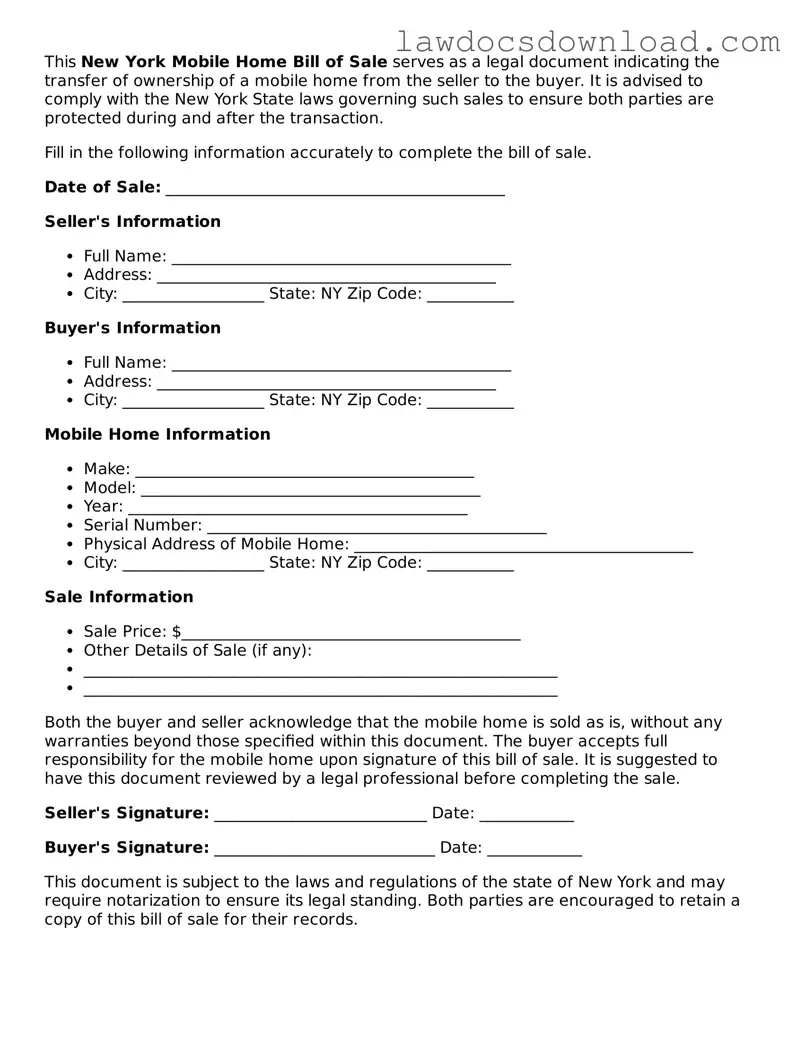The New York Mobile Home Bill of Sale form shares similarities with the Vehicle Bill of Sale form. Both documents serve as proof of sale and transfer of ownership from the seller to the buyer. They typically include important details like the make, model, year, and identification number of the item being sold, alongside the sale price and date. These forms are crucial for legal documentation and may be required for registration or titling processes within their respective categories.
Another similar document is the Real Estate Bill of Sale. This document, like the Mobile Home Bill of Sale, is used to transfer ownership of property from one party to another. However, the Real Estate Bill of Sale is used specifically for the transaction of land or fixed property, while the Mobile Home Bill of Sale is for mobile homes, which are considered personal property in many jurisdictions. Both documents require detailed descriptions of the property and the terms of the sale.
The Boat Bill of Sale is also analogous to the Mobile Home Bill of Sale form in function and purpose. It records the sale and transfer of ownership of a boat from the seller to the buyer, specifying the vessel's details, including hull identification number, make, model, and year, along with the sale price and date. Similar to mobile homes, boats often require this documentation for registration and titling with the appropriate state authorities.
Similar to the Mobile Home Bill of Sale, the Motorcycle Bill of Sale is used to document the sale and transfer of ownership of a motorcycle. It includes vital information such as the VIN (Vehicle Identification Number), make, model, and year, in addition to the sale price and date. This document ensures that the transaction is recognized legally and assists in the registration and titling process.
The Equipment Bill of Sale is akin to the Mobile Home Bill of Sale, as it is used for the sale of equipment rather than vehicles or real estate. This document details the specifics of the equipment being sold, including a description, serial number, and condition, as well as the sale price and date. Both forms serve as a legal record of the transaction, proving transfer of ownership.
The Firearm Bill of Sale closely resembles the Mobile Home Bill of Sale, despite their different purposes. It is specifically designed for the private sale of firearms and includes critical information such as make, model, caliber, and serial number, in addition to the identities of the buyer and seller. Like the Mobile Home Bill of Sale, it acts as a legal record to document the transfer of ownership.
The General Bill of Sale is a broader document, covering a wide range of items not specifically covered by more specialized forms like the Mobile Home Bill of Sale. It can be used for the sale of personal property from one individual to another, detailing the item, sale price, and date of sale. This flexibility makes it versatile for various transactions, offering legal proof of transfer similar to the Mobile Home Bill of Sale.
The Artwork Bill of Sale, while used for a specific category of items, parallels the Mobile Home Bill of Sale in its purpose of documenting the sale and transfer of ownership. It focuses on artworks, including essential details such as the artist’s name, the artwork's title, and its provenance, alongside the sale date and price. Both documents serve to establish a legal record of the sale, beneficial for both buyer and seller.
The Furniture Bill of Sale and the Mobile Home Bill of Sale document the sale and transfer of ownership of furniture and mobile homes, respectively. Each form details the items being sold, with descriptions and conditions noted, along with the sale price and date. These forms ensure that the sale is legally recorded, providing a reference for warranty or ownership disputes.
The Business Bill of Sale is used to document the sale and transfer of a business, similar to how the Mobile Home Bill of Sale documents the sale of a mobile home. This form includes information about the business being sold, such as its name, assets, and location, in addition to the terms of the sale. Both forms are essential for the legal documentation of their respective sales, facilitating a smooth transfer of ownership.

